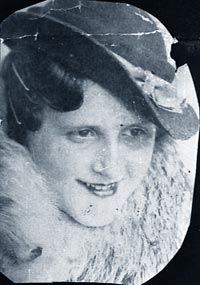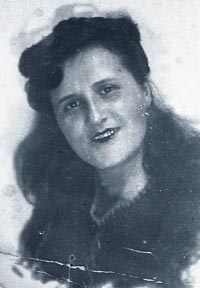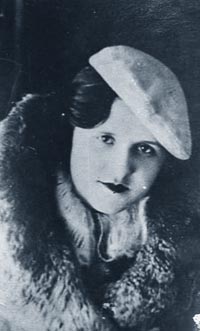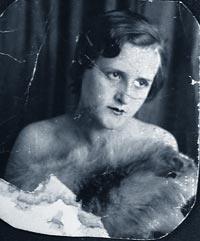









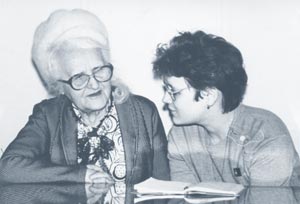 I do not know who to blame for my fate. As one would say: I have no idea - that’s beyond me. I am not very knowledgable about politics, but I got a definite idea about who is an enemy of the people and who an honest and respectable Soviet citizen.
I do not know who to blame for my fate. As one would say: I have no idea - that’s beyond me. I am not very knowledgable about politics, but I got a definite idea about who is an enemy of the people and who an honest and respectable Soviet citizen.
The reprisals of the years 1937 and 1938. Many people do not want to believe that something like that could ever have happened. Even young people, seventeen or eighteen years old, express their indignation in the newspapers and require to finally stop bringing the government authority of those times into disrepute and to keep on at it. So what? I do not reproach anybody for it. If I were in their place – I would not believe all this, either.
In order to be able to believe, one has to make the experience oneself, watch carefully, be a witness to what is going on, live through the situations. However, may the good Lord save us from such an experience! I do not want, and probably nobody wants something like that ever to happen again. Enjoy your life, be happy, love your home country and do everything within your power to make people peacefully live on earth for ever.
I do not intend to write about the great figures of our world, who have gone through this terrible school of life (I do repeat that it is not for me to judge anybody). I would like to write about me and my family.
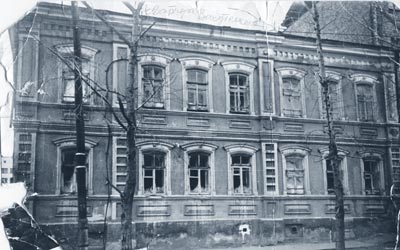
I was born in Krasnoyarsk. We were seven children. As from his childhood dad worked for the Yenisseysk steamship company His parents had already died. At first he had a job as an unskilled worker, later he was an apprentice, an ordinary seaman, a boatswain, a pilot, and during the last 5-6 years before 1937 – first steersman on board the steamship „Maria Ulyanova“. He was a member of the All-Russian Communist Party of the Bolsheviks from the moment of the Lenin enrolment (mass entry of citizens into the Communist Party of the Soviet Union after Lenin’s death – translator’s note). Mum was born in Odessa. Grandfather went into eternal exile in chains, with a transport of forced labour workers, for having set fire to a manor. Mum, grandmother and my brother followed him. Mum was 18 years old at that time. Having arrived in Krasnoyarsk, she was sent away into another family as a nanny, and her parents settled down in Balakhta. Later mum worked as a domestic servant in the family of Popov, a clergyman, and as a chamber-maid at Gadalov, a merchant. She married dad and life went on – a quiet and peaceful family life. The elder brothers got married, while my sister and I stayed in our parents’ house.
And then came the year 1937.
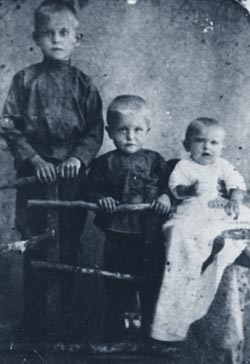 It was nighttime. I wakened up by some strange whispering; my little sister
Galochka was asleep. I could hear a woman say to my mum: „Wake up the girl!“ The
woman was dressed in a black furcoat and wore a head scarf made of goatwool. A
minute later a man in military uniform appeared and said: „The girl is to come
out of the bedroom!“ We noticed Mum’s terriefied look and her tear-stained face.
When we asked her „where is dad?“ – she replied: „ Over there, in our bed-room“.
We went in. The whole apartment had been rummaged through- everything had been
thrown into disorder; dad stood there, already completely dressed,and beside him
– two soldiers. After the search of the children’s room was finished, one of the
soldiers took out a nagan pistol; and then they saw dad out and told him to
climb into a car that stood near the front section of the building. My sister
and I screamed and ran after the car. The driver brought the car to a standstill
and the woman exclaimed from the window: „Don’t cry – tomorrow your dad will be
at home again“.
It was nighttime. I wakened up by some strange whispering; my little sister
Galochka was asleep. I could hear a woman say to my mum: „Wake up the girl!“ The
woman was dressed in a black furcoat and wore a head scarf made of goatwool. A
minute later a man in military uniform appeared and said: „The girl is to come
out of the bedroom!“ We noticed Mum’s terriefied look and her tear-stained face.
When we asked her „where is dad?“ – she replied: „ Over there, in our bed-room“.
We went in. The whole apartment had been rummaged through- everything had been
thrown into disorder; dad stood there, already completely dressed,and beside him
– two soldiers. After the search of the children’s room was finished, one of the
soldiers took out a nagan pistol; and then they saw dad out and told him to
climb into a car that stood near the front section of the building. My sister
and I screamed and ran after the car. The driver brought the car to a standstill
and the woman exclaimed from the window: „Don’t cry – tomorrow your dad will be
at home again“.
This happened on the 13th of February 1937, but our dad did not come home – neither „tomorrow“, nor after a year; he never came back.
In the course of the first days nobody knew at school what had happened at our home. I was crying incessently during the lessons and finally told everything to my teacher. On the 18th of February 1937 they announced: „You have been expelled from the Komsomol“ (Young Communist League; translator’s note), and my little sister was asked to leave the pioneers’ assembly.
Life at school became unbearable: the never-ending humiliations and gross insults uttered by the other children („daughter of an enemy of the people“, „spy“) and – they would pull me by the pigtail or throw into my face any object they liked.
The teachers somehow tried to settle the situation, but did not succeed in doing so, and even some of the teachers changed their attitudes: they stopped calling me in front of the blackboard and to check, if I had done my homeworks. I went to the 8th grade of school No. 18 (a school for the children of those, who worked for the river navigation, to be more precise, for the employees of the Krasnoyarsk steamship company), my sister to the 4th.
After a while mass arrests set in, and for that reason even at school the number of children of „spies“ and „traitors to the country“ increased considerably; there was no way out - they had to go through this terrible torture of humiliation and offense.
Towards the end of February six children refrained from going to school and gave up learning. There were rumours that our fathers had been put into prison. Instead of going to school we set out for the prison building. For hours and hours we kept standing there, no matter what the weather was like, no matter how frosty it was, just hoping that someone behind the bars would become aware of us. We screamed and cried, but nobody gave us an answer. The eaves hanging down from the roof made it impossible for them to see us.
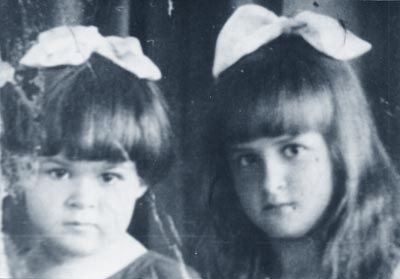
Mum learned that I had given up school, and this meant another serious blow to her. But inspite of her constant preaching and reprimands I did not take part in the lessons anymore. However, I continued my studies at the music school. I try to find myself a job, but they did not employ me: I had not completed the 16th year of my life at that time.
But not without good reason they say: „There is no world without good human beings!“ I was finally employed as a clerk at the legal advice office of the Krasnoyarsk regional consumers’ cooperative. And after work I attended the evening school of musics.
This is how we lived: mother stayed at home doing sewings for other people to order, I went to work and sister Galochka to school. About our dad we did not receive any news.
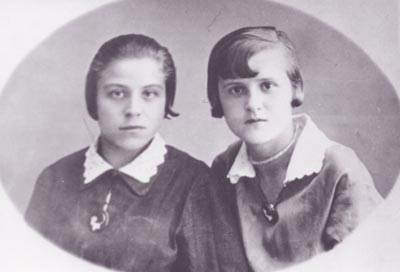
On the 10th of October 1937, at 8 or 9 o’clock in the evening, I returned home from the music school. An old woman, our neighbour, was standing near the gate and said with tears in her eyes:
„Do not go home; two military men took away your mum by car, and Galochka, too. They have just come back and are now waiting for you. Run away!“
„They“ had already been to the school of musics, but somehow failed to meet me on my way home. But about these details I only leaned nine years later, when I came back to Krasnoyarsk, from one of the women who had been working at the music school as a cloakroom attendant at that time.
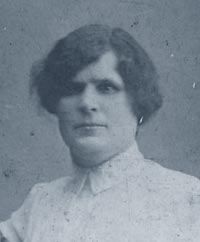 Where should I run away to, after all? There was no place I could go to: my
eldest brother lived in Yenisseysk and worked as a skipper on the steamship
„Pioneer“, the next one lived in Leningrad. He worked for the Baltic Fleet. The
youngest brother served in the Soviet army. I ran back home, where the soldiers
were, in fact, waiting for me, shuffling about impatiently from one foot to the
other. With them was a woman, as well as another few people. Mum and Galochka
were not at home anymore.
Where should I run away to, after all? There was no place I could go to: my
eldest brother lived in Yenisseysk and worked as a skipper on the steamship
„Pioneer“, the next one lived in Leningrad. He worked for the Baltic Fleet. The
youngest brother served in the Soviet army. I ran back home, where the soldiers
were, in fact, waiting for me, shuffling about impatiently from one foot to the
other. With them was a woman, as well as another few people. Mum and Galochka
were not at home anymore.
Judging by the situation they had searched the apartment. Everything had been thrown into disorder or tipped over, the contents of the chest drawers, books – everything lay scattered upon the floor. When I asked them where my mum and Galochka had been taken to, nobody answered. I do not remember what happened then, but one of the women wiped my face with a moist towel and offered me water to drink. Then they accompanied me out into the street, asked me to climb into a car and took me to the Krasnoyarsk prison.
Having reached the prison yard they asked me to get out of the car not far from the main building. And then we went into the building. There was a long corridor, to the right – a door with a Judas hole; further down the corridor there was another door, which stood open (it turned out to be a room for the guards, investigators, etc.). They led me into the room to the right, the one with the Judas hole, and immediately locked the door. There were two barred windows.
Deep silence reigned, it was about 11 or 12 o’clock in the night. „Go away from the door! Move over to the window and stay there, so that I can see you“, one of the guards shouted through the Judas hole. I did has he had told me to do, but I did not understand at all what it was good for.
And then, three months later, when I was called out to be investigated, someone unnoticedly pushed a note over to me: „Your dad saw you on the day of your arrest, and they told him that his daughter would be shot, if he did not sign“. And I, being such a simpleton, was content to learn that I would see my dad here in prison and that three days later they would release me and allow me to go home (these were the words of one of the soldiers who had taken me to the prison).
There was a bench in the room. The permitted me to sit down, but I was not allowed to sleep. In the middle of the night, around 1 o’clock, the room filled with lots of women. They were so many that after a short while one could only stand tightly packed. Terrifying screams could be heard – mothers shouted the names of their children, not knowing where they had been taken to. Many fainted, and the room got more and more crowded. This went on till the early morning.
One of the women asked: „ Did they arrest you together with your mum?“ - I said: „ No, neither my mum nor I was arrested; they just took away my mum and my sister to some place, and as far as I am concerned, they only want to ask me a couple of questions – and then they will probably take me to that place, as well; they promised to release me within three days“. She looked into my eyes and said: „Oh my good girl!“ – and ran her hand over my head.
The official registration went on for the whole night; they took finger prints. Then they lead us away somewhere and a new lot of women filled the room.
In the morning, around 9 or 10 o’clock, they brought another group of women, and this was when I met my mum. She had been part of the first group of arrestees and had spent the whole night in the women’s section of the prison; and now they had brought this group here, in order to take everybody’s fingerprints.
I do not know whether it is worthwhile to describe this meeting. I believe that even without any additional detailed explanation every mother will be well aware of what it means to see her own minor and entirely innocent child in such a situation. And I was the youngest of all inmates who had been put into this women’s prison (some were 18 or 20 years old). Mum asked: Where is Galochka?“ – I answered in the words of our neighbour: that she had been taken away.
Some of the women, among them my mum, were taken back to the women’s section then. mum screamed: „ In case they really intend to lock you up, ask them to allow you into cell No. 4 – that is where they put me!“ It would have been better, if she had not mentioned that...
The women’s section stretched along the prison yard, about 200-250 metres in length. The one-storeyed wooden building with the little exercise yard, where the inmates used to take their walk, was surrounded by a barbed-wire fence. In this section there were eight cells – in one of them they kept recidivists (old offenders, repeaters; translator’s note), the remaining cells were occupied by political prisoners. The new lot of prisoners, including myself, were taken to this section. They started distributing the people to the different cells. The prison matron on duty was Yudina. I begged her: „Auntie, put me into cell No. 4!“
„And why do you want to get there?“ – I replied: „ My mum is there“. – She started to shout in a vicious, harsh voice: „I am not your auntie, you monster of a spy!“ They were all sent into their cells, while I remained the only person standing in the corridor.
And then, finally, she pushed me into cell No. 8, which was occupied by thieves, prostitutes, murderesses and such, who had obviously dipped into the till at the end of the month. Until today I remember the violent push in my back, when I was hit by the cell door – and this terrible metallic noise of the bolt. I had the impression that the lock had not been fitted into the door-frame, to which I leaned back in fear, but was positioned directly in my back. One of the women received me; as it turned out later, she was 35 years old, her name was Zina, but they nicknamed her „the Queen“. She had already several previous convictions for theft and murder. Her body was covered with tattoos, but her clothes looked much better and cleaner than those of the other inmates. She spoke the language of the hardened professional criminals. And when the crowd pounced on me to take away my belongings, she sharply commanded: „Get away from her!“
In the cell the most important rule was that all newcomers had to undress, unless they were thieves. The others took their clothes away from them for their own use, and in return gave them any possible kind of rags. The women looked shabby and dirty, and they were forced to submit themselves and keep silent. One of the robbed women complained to the female jailor on duty. And when, at noon, a full container of hot porridge was delivered to the cell, the thieves bound her hand and foot and poured the hot porridge on her. She lost conscience and was taken to the hospital. I do not know what happened to her afterwards.
Even the guards were afraid of this cell: since all women were criminal offenders, they were not taken to the exercise yard – they were not allowed to take a walk. And Yudina had pushed me just into this cell. Following the „Queen’s“ command, the crowd got away from me. She approached me. She held a child of about two years on her arms (it later turned out that there were only women with children in cell No. 4).
She asked me: „Why did they bring you here?“ - I replied that I had no idea.- „Which paragraph?“ – „I don’t know.“ – „Are you a political prisoner then?“ - „I don’t know; my mum is also here, in cell No. 4. They did not allow me to be with her“. – „ Are you a counter-revolutionary?“ – „No“, I answered. – „Well then, to hell with you!“ she said. „You are a neat girl. Won’t you like to take care of my little Vitya?“ – She pointed at the child, and I answered: „If you trust me that much I will do it.“
Maybe it was due to this circumstance that nobody offended or insulted me. I did not only take care of Vitalka, but of all four children: I bathed them and was busily sewing. I became very fond of the children. I spent there two months, became a witness of fights, murders, onanism and other events, which nobody would ever get an idea of, not even in one’s wildest dreams.
Later it came to our ears that a new section, §59-3 (terrorization and murder of prisoners by other prisoners held in the same cell), had been passed, and some of the thieves were executed. I do not know what happened to their children.
Cell No. 8 was broken up, and I was moved to cell No. 4, where I finally met my mum. We stayed together for two weeks. What a heart-felt, never-ending joy, when we saw eachother again, and what a flood of tears. I was afraid of losing her again. During the night, sound asleep, I held mum’s hands so firmely that my fingers left blue marks on them.
She endured the pain, because she did not want to disturb my sleep; whether she ever succeeded to fall asleep herself – I do not know. She was incessently crying day and night, and as soon as she had nodded off, she started calling Galochka’s name like mad.
After two weeks they called mum out for the interrogation and I did not see her again until 1947.
And this is how cell No. 4 looked like: a quadrate room, two barred windows with a view of the fence that surrounded the prison area. To the left of the door – a small table for the receipt of the meals, to the left – the latrine bucket. On the two-storeyed bed boards one could not place more than twenty people. The common wooden plank bunks, however, were single-tier and had been arranged in the shape of the Russian letter „P“ (U-shaped; translator’s note) – 70 to 75 prisoners found room here.
We slept on the bed boards, below them on the floor, on and under the table, always two of us, with heads in opposite directions. In a word: we lay down wherever we could take a rest. In the cell there was not a single girl of my age, they were all adults. I was the youngest inmate in the whole prison. There was Tamara Dumchenko, the daughter of a Krasnoyarsk party worker. She was already 18 years old, and they accused her, like all the others, of being a traitor to her country and of having secreted back the anti-Soviet activities committed by their fathers or husbands.
The interrogations mainly took place during the night. They usually called out several prisoners at the same time, some of them were even called out twice. Quite a few were detained and questioned for 16-18 hours. They returned to the cell with swollen legs and faces and black and blue marks under their eyes. It some times happened that one was literally unable to identify the person.
People with weak nerves often went mad. I do remember a certain Vera Vasilevna; I think her family name was Mamkina. If I am not mistaken, she was married to the director of the Krasnoyarsk steamship company. She would knock at the cell door day and night screaming:
„Give me back may child!“ The jailors dragged her out, beat her and then pushed the seriously injured woman back into the cell.
These treatments resulted in insidious madness. She crawled under the table and, even though we summoned up all our strength, nobody succeeded in pulling her out again. Her insanity became definitely evident. The prison doctors, however, considered her as a malingerer. Later, when she lived in exile in Turukhansk and was neither spied on nor guarded, she managed to leave. They only found the remnants of her leather coat, her shoes and parts of her long pig-tails, which once had reached almost to her heels.
And then there was Komarovskaya, who also shouted herself hoarse for her son Genochka. Her screams filled us with such a horror that some of the women even fainted.
I do not remember a single week, when there was not at least one woman losing her mind. The unfortunate women were taken away to some unknown place and we never heard of them again.
When the prisoners came back from the interrogation they usually brough along some news. Thus, rumours were going that lots of husbands had been executed. In the cell the situation became even worse.
And then it was my turn to go. The investigator’s name was Sinyushin. I will never forget his family name.
Question: „What kind of friends did your father have?“
Reply: „Dad did not have any friends, he was kind and polite towards everyone“.
Question: „What did your father say against the Soviet power?“
Reply: „My dad has been a true Communist since 1917; he was educated in this spirit from the very beginning, he was a child of his time. Since the eight’s year of his life he grew up in a reception camp for orphaned children. An later he taught us how to become true and upright human beings, who love their country. He instructed us in singing the songs „Vastness of my native land, „Our steam locomotive“, „Take courage, comrades, forward, march“. I love to sing these songs, but I also like classical music.
At these words the investigator became furious and began yelling at me: „I will show you“ – and slapped me in the face. Fortunately, the telephone rang in this very moment. He was called away from the very moment. He was called away from the interrogation. He gave the order to lead me away and I was taken back to the cell.
One week later they summoned me to the second investigation, and this time they even issued an examination record. The questioning was carried out by a certain Sinyushin in the presence of a second investigator.
They accused my father of having committed secret, counter-revolutionary crimes, and then they tried to force me to sign these lies. I could not understand that my father was said to have given me instructions to go to Novosibirsk, in order to deliver someone documents of anti-Sovoiet nature - I did not have the slightest idea of all this (it was only in 1954 when I went by train for the first time in my life). And I was supposed to sign all this. I did not sign anything.
They did not beat me, but they put me into a completely empty cell till the next morning; there was not even a single chair. In the morning they took me back to the investigator's cabinet; again I refused to sign any papers, whereupon they pushed me back into the empty room, where I had already spent the previois night.
I stayed there until 3 o'clock in the afternoon - hungry, without a drop of water. I do not remember that I dropped to the floor and fell asleep, and I do not know, how long I slept. At 3 o'clock the guard on duty came in and took me back to the cell.
Time passed by. With many inmates the preliminary proceedings had already come to an end. On the 17th of April we celebrated my 17th birthday in the cell. I got gifts. One presented to me a little cushion cover - an admirable needlework (on the dark blue silk cloth there was an ornate embroidery - a real work of art, done in satin stich by means of woolen threads). Another woman gave me a beautiful doll, the next one a woman's jacket knitted from camel's hair. One of the prisoners had taken this camel's hair with her when the NKVD people, upon her arrest, had seized a matress during the house search. The knitting-needles were made of small sticks, completed with pieces of broken glass, which the women had found in the exercise yard during the stroll. The wool they had scrapped together by undoing and ravelling old clothes. And then they either used the threads for embroideries or as knitting yarn.
The number of people in the cell decreased, They took the inmates away to some unknown place, and they would not come back again. In the cell there was a strange atmosphere; everybody was down-hearted. The women returned from the interrogation beaten up and exhausted, giving a picture of misery. During the night wild, blood-curdling screams could be heard, and all cell inmates woke up with a start.
I did my best to calm them and set their mind at ease, read out poems aloud and even tried to compose poemes myself:
Oh these black days,
This time will soon come to an end.
One day we will be free again,
Let us show fight
And prove it by working persistently;
We will become the heroines
Of Stalin's country.
Good many people smiled condescendingly at the poems, some said: "Write more, they are good".
Our daily food ration consisted of 600 grams of bread, soup and this inevitable porridge for lunch, tea in the evening, as well as 1 kilo of sugar, 150 grams of butter and 1 kilo of salted fish once a month.
Those who were in possession of some money were allowed to buy 1 kilo of soshki (small ring-shaped crackers; translator's note), half a kilo of best fresh butter and an additional kilo of sugar. However, we were not permitted to go to the prisoner's commissary ourselves, but had to effect such purchases through the guards. Although I had no money, the other inmates offered me something of what they had; each of them gave me a dried soshka, until I finally owned more soshki than each of them had herself. And then I shared with those, who also had no money to buy any additional food.
The days passed by, the people gathered fresh hope and were quite confident that everything would be cleared up and that they would soon be able to go home.
On the 25th of June 1938 some of the prisoners were called upon to place themselves in the corridor, where they were read out their sentences. Zjey were informed about the terms that had been fixed upon the decision of the Moscow Special Board. My sentence was: internal exile for a period of five years (to the rmotest north).
On June 28th each of us received two loaves of bread, 3 kilos of fish and half a kilo of sugar, and then women and men were taken on board the steamer "Maria Ulyanova" under escort - the steamer my father had travelled on, where I had spent my childhood (in summertime dad had taken us along to travel with him, and sometimes even mum had been with us).
The male prisoners were placed in the cargo holds and we, the women, in the bow - on the floor. During the trip the ship made fast several times, and prisoners were disembarked - in Vorogovo, Yartsevo, Chulkovo, Yermakovo, etc. I got to Turukhansk.
Three huge towboats belonged to the Yenisseysk shipping company at that time (maybe this is still the case today): the "Krasnoyarskiy rabochiy" ("Krasnoyarsk worman"), the "Klim Voroshilov" and the "Sovietskaya Sibir" ("Soviet Siberia"). And in 1943 one of them, the motor ship "Sovietskaya Sibir", was supposed to deliver a large freight to the inhabitants of the north: foodstuffs, manufactured goods and technical equipment.
The motor ship had more than 30 barges in tow, fully loaded with flour, meat, fish, salmon, balik (dried sturgeon; translator's note), caviar, butter, tinned stewed meat, ham, alcohol packed in small drums of stainless steel, and many other commodities in short supply, as well as clothes, shoes, textiles, i.e. all kinds of goods that would sufficiently provide the inhabitants of the north for a period of one year. There were also a couple of barges loaded with chemials, such as ammonia and carbide).
Neither steamer nor freight reached their final destination, the port of Dudinka (due to the early beginning of autumn the caravan moored in the Nizhnaya Tunguska district - about 70 km away from Turukhansk). Workers were now urgently needed to rescue the ships' caravan. They were to clean the waterway from ice, in order to get all the barges through as soon as possible. Elsewise they would run the risk that ships and cargo became crushed by drift ice during the next spring high water.
The labour force consisted of detainees from various prisons and camps, who were transported there by airplanes. On the 17th of April 1943 they also moved me to the spot by plane, together with a group of inmates from the Turukhansk remand prison. Upon our arrival we were equipped with special clothes (trousers, wadded pea-jackets, caps, felt boots, gloves). They accomodated us in the ships holds of two barges, men and women separated from eachother.
The batges, which were generally used for the transport of cattle, were equipped with simple bed boards; an iron stove had been set up - and this is where the prisoners had to live all through the winter (I got there in the spring, in April).
The contingent (prisoner work force) was made up of different kinds of people - most of the men were recidivists, the majority of the women had been sentenced pursuent to an ukase, many of them were young girls at the age of 16-20 with a term of confinement of 5-10 years (one of them had just picked up a frozen potato, others had merely collected some millet from the mud). There were deserters, who had ran away from the front, as well as followers of Vlassov and Bandera and people, who had become victims of reprisals in 1937-38.
Every morning we had to line up and were then accompanied to our place of work under escort. We mainly had to chisel out ice holes, knock off the ice, i.e. to clean the waterway for the caravan to pass through.
It was heavy labor to chisel out ice for 8-10 hours every day - and the ice was about two meters thick. But the girls were young, they did not lose heart and always went out to work singing. It seemed as if they had all come together just because of their wonderful voices and delicate musical ears. There was Dasha, for example, a girl of about 23 years (sentenced pursuant to an ukase). She was such a strong, strapping, red-cheeked person. Her voice could be compared to the one of Zykina. She was the solo singer. She started singing: " Why do you shroud in fog, clear sunrise" or "There are the woods and rivers, where I used to walk with such a pleasure", and then all women joined in. Our songs were heard throughout the tundra, over the river Yenissey, and our hearts were filled with both sorrow and joy. Sorrow about the grils, who were still able to sing in these miserable circumstances, and joy about the fact that their hearts had not broken, that they had remained human beings.
There were also civilians (as we called them), free people, - the crew of the motor ship, the captains and sailors of all the barges, as well as the children and wives of the crew members, who sometimes travelled with them, as well as the guards.
We worked heard every day without sparing ourselves. We tried our best to do what had to be done as quickly as possible, since we were very well aware of the fact that the coming spring would take a heavy toll. On the 25th of April we had done the chied part of the work, but nobody prepared to lead the ships' caravan through the waterway. Music was incessantly heard from the motor ship, women's voices, roaring laughter (they said that some of the detained girls had been employed on board the ship as service staff already at the beginning of our involuntary stop.
On the 1st of May 1943, at 6 o'clock in the morning, when we were all yet asleep (the signal marking the end of the sleep would only sound at 6.30), we heard the emergency sirens of the motorship sounding over to us - then a terrible crackling from the hull, and the barge vehemently listed. This was the first break-up of the ice. All women managed to run away. We did not know what happened to the men, because their barge had moored far away from ours. What was to be done? We were to rescue ourselves and therefore decided to move over to the island. Now and again the ice started to move, and the island was about 0,5 - 1,5 km away. It was early in the morning, quite dark and foggy. The people ran about in panic and scare, giving screams, with tears in their eyes, and a group of men hastened towards us, in order to save our lives. They had already taken away all men in bad health, and now they had come to helpus as well. It was a group of prisoners, mostly recidivists. They rushed to our rescue and did not leave any of us behind. They helped to get the children and women of the crew members to safety (i.e. the families of the captains who were navigating the barges).
We ran all out to the island. A few hours later - the second ice drift. The barges broke to pieces, turned over, capsized, there were cracking noises everywhere. When the water rushed into the holds, flames blazed up on the barges loaded with carbide and ammonia, a sea of flames. The barges next to them also caught fire together with the cargo. The motor ship sprang a leak, its stern went under, the prow stuck out of the water. The people who were standing there, panicked; screams were heard. But the ice crushed the barges and swepted the broken pieces apart. Several fragments of the ships' hulls were washed ashore, others submerged together with the load - foodstuffs to the value of 1 million rubels. Well, this happened in 1943, when the people in the country were suffering from hunger, when they had forgotten about the existence of bread. And just now of all times these things were floating on the water - bread, numerous big sacks filled with flour and milk powder, best fresh butter, condensed milk, canned meat, meat, bacon, etc. There was not the slightest possibility to save the cargo - there was no way to reach it and get hold of it.
The weather changed from one moment to the other. Wind sprang up, the temperature fell. It seemed that the ice stopped its impetuous drift, but it was moving anyway.
However, we were not completely cut off from the outside world. Helicopters arrived and air-dropped slips of paper: "Rescue the people, we are expecting a flood; the water level is going to rise up to 5-7 meters". The island slightly sloped towards the river. There was no other way left but crossing the river through the ice up to the opposite riverbank, in order to get to the village of Nizhnaya Tunguska.
We had to take both risks under consideration: either die on the island by drowning or try to get to the opposite riverbank during the break-up of the ice. We decided to go. We supplied ourselves with ropes, planks, axes, and then the whole crowd marched off. All of them set off, regardless of their rank: prisoners, guards, free workers, crew members, the chief of the camp - none was left behind. They only had in mind to get themselves to safety and stay alive. As far as possible they helped each other. Particularly during the crossing there were lots of helping hands: Ivan Kuznets, Mikhail Chekhlin, Mikhail Orlov and many other lads (whose surnames I do not remember). They all belonged to the group of recidivists. They tried hard to assist the ill persons, old people and women. Ivan Kuznets fastened two girls (5 and 8 years old) to himself (they were the captain's children), one on his back, the other in front of his belly. And in this way they crossed the ice. Apart from this, both endes of the rope were hanging down, so that he asked me and another detained girl, named Martochka, to hold tight on them, until we had safely reached the opposite riverbank.
Unfortunately, some people did not succeed to escape with their lives - they perished.
After we had traversed the river, the chief of our camp decided to go to the village and negotiate about where all the people could be accomodated. Chief and guards were received kindly, while the villagers refused the prisoners for fear of being robbed.
Towards evening the ice was in full move. The weather changed, a sharp, biting wind sprang up. Along the riverbank there was no wooded area nor any other shelter. The people were wet to the skin and entirely frozen through; there was no firewood around. The male prisoners (about 30 or 40 men) were deeply hurt by the villagers distrust; they set off for the village and started pulling down a barn and a coupe of front yard fences. The guards did not interfere and left the prisoners alone. The head of the kolkhoz gave the permission to fetch a couple of horses, so that the prisoners could transport the pales away. We made campfires and set about digging holes, where we could take shelter and sleep at night. We warmed ourselves at the fire, tried to dry our clothes, but only the outer garments dried - the underwear remained moist. We crouched into the dug-outs in groups and tried to sleep.
Like this we lived for about two weeks, as long as the Yenissey was still covered with ice and the water had not run off the island. Everybody looked terribly exhausted and shabby, the faces were sooted by the camp fires, the clothes scorched, the underwear dirty. The people became infested by lice. Some caught a serious cold, became ill; they were all hungry. They provided us with bread from the village, but as already mentioned - it was the year of famine - 1943. What were these people able to share with us? When the sludge ice became less, the lads took their boats and set off for the village to get a sackful of flour. After their return we baked flat cakes in the ashes of one of the camp fires.
The sludge ice had gone, the river flew on quietly, the weather improved. The wind was flowing gently, it was getting warmer and we were taken back to the island by boat.
The wrecked barges lay scattered along the riverbank - a hopeless muddle: pieces of rare gone-off meat, broken boxes, butter mixed with mud, as well as most valuable foodstuffs, such as dried sturgeon, beluga (white sturgeon; translator's note), keta (Siberian salmon; translator's note), cans with caviar, canned milk, high-quality sausages, confectionery, noodles and the like. Everything was mingled with dirt, had become wet and lay scattered all over the riverbank and even in the water. Parts of the foodstuffs, which had been transported in wooden boxes, were crushed by ice floes. On the river Yenissey were floating sacks with flour, egg powder,powdered milk and cream. The people in the country suffered hunger, they starved, and right here a number of blockheads had caused such a disaster. nobody was willing to assume responsibility, just the opposite - one of the persons definitely responsible for our unvoluntary stop later occupied an influential position and followed this occupation for many years.
Having reached the island, we were ordered to get the remaining cargo to safety: collect the foodstuffs, store them, drag the freight out of the destroyed barges and make any possible attempt to establish some kind of order.
We built living quarters from the planks of the wrecked barges and settled down; we even organized a medical unit, where the ill priosners were placed. We even disposed of physicians. They sent us new guard troops by steamer, together with another lot of prisoners. We set up a barbed wire fence, which was to surround our camp - the zone! When we went to work, we had to leave the zone under escort.
The new guards consisted of a self-protection group - they were all imprisonned Ukrainians and Ossetes, who had been arrested during the war. They were true executioners. How they jibed at the weak patents and invalids! They beat them and told them to sit in drafty places for a long time, and the like.
The labor was hard and dangerous, because some of the barges were partly under the water surface; we had to creep into the flooded cargo compartments, in order to pull out boxes and containers. The people fell, foundered, some were crushed either by the cargo or by ice floes that had remained in the holds.
The prisoners refudsed to carry out this kind of work, but they were thrashed again and again.
As explained at the beginning, summer behind the Polar circle is the portion of the year when the sun does not set below the horizon. They tok advantage of this circumstance and would not allow us to take a rest. We had to work day and night; the prisoners tried to sleep, wherever they were able to seize the opportunity of doing so. We were only guarded back to the zone for lunch, although this was not necessary at all - there were enough foodstuffs at our work-place. The people were exhausted, tired and suffered insomnia; they would often drop to the ground, , whereupon they were additionally punished by the guards, who rammed their rifle butts into the poor people's backs and faces and dealt out punches on their heads.
For some reason or other I fell ill; I was tired to death, but was not allowed to have a rest or sleep. Martochka And I waited until the guard had left and then decided to hide behind a bush, in order to take a nap for at least half an hour. We were sure that they would not notice our absence, because there were so many people there. Well, and then we stealt away. We dropped to the ground and immediately fell asleep. Whether he had noticed by himself that we were missing or someone had betrayed us - he found us, anyway. We woke up with a start, being kicked and vulgarly sweared at. He took us away from the place, far away from where the brigades were working, into the vastness of the tundra, ordered us to place ourselves with our faces towards a tree and shouted: "I will shoot you for having attempted to escape". He started firing shots. One shot missed my ear, another one almost hit Martochka. he took delight in this situation, while we were standing there with our backs turned on him, waiting to be executed. I do not remember how I felt at that very moment. I heard another rate of fire and looked at Marta. She screamed, cried. I can still hear her words: "I will never see mum again". And then she dropped to the ground. I was waiting for the next shot, as I had every reason to believe that the guard would kill me, too. But nothing happened. Showering abuse on her he approached her, seized her by the jacket and tried to set her on her feet again; but she did not move - she had lost conscience. Marta was 18 years old at that time. The guard asked me to get someone from the brigade to carry her away.
Two days later the guard (they called him Vassil) disappeared. Members of the supervision and camp commanders tried to find him, but it was all in vain. The prisoners finally declared that the other guards would meet the same fate, unless they stopped acting on their own authority. They were all suspended, except our old watchmen, who used to treat us, the prisoners, according to law, the more since some of them had also endured this terrible crossing of the river. By the way, two of them, still young people, had gone down and were rescued by Misha Chekhlin at the very last moment.
In the summer of the year 1943 all men of our camp up to the age of 40 were called up to the front. I do not know, in how far this is true, but he was allegedly awarded a decoration as Hero of the Soviet Union. The remaining prisoners, who had been sentenced on different sections, were transferred to Dudinka on barges, to the 2nd forced labor camp sector of the Norilsk combine.
